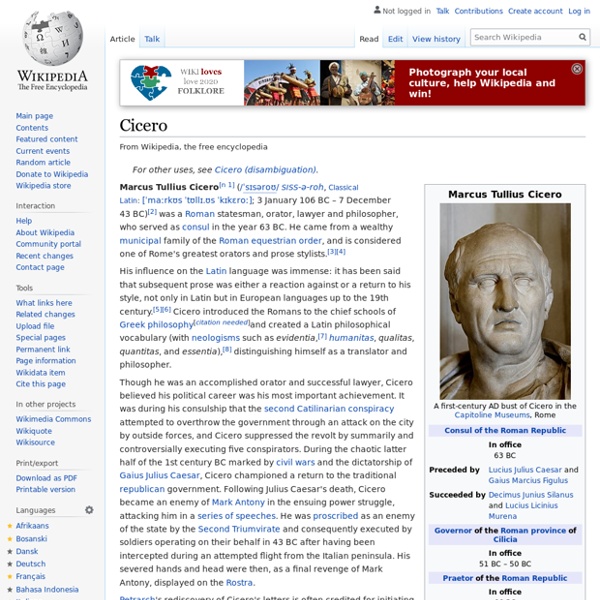Quintus Hortensius
Quintus Hortensius Hortalus (114 BC – 50 BC) was a Roman Optimate[1] and orator. He was consul in 69 BC alongside Quintus Caecilius Metellus Creticus. Biography[edit] To this circumstance perhaps, as well as to his own merits, Hortensius may have been indebted for much of his success. Many of his clients were the governors of provinces which they were accused of having plundered.
Gaius Gracchus
Ancient Rome politician Gaius Sempronius Gracchus (154–121 BC) was a Roman Popularis politician in the 2nd century BC and brother of the reformer Tiberius Sempronius Gracchus. His election to the office of tribune in the years 123 BC and 122 BC and reformative policies while in office prompted a constitutional crisis and his death at the hands of the Roman Senate in 121 BC.
Hellenistic philosophy
Hellenistic philosophy is the period of Western philosophy and Middle Eastern philosophy that was developed in the Hellenistic period following Aristotle and ending with the beginning of Neoplatonism. Hellenistic schools of thought[edit] Pythagoreanism[edit] Pythagoreanism is the name given to the system of philosophy and science developed by Pythagoras, which influenced nearly all the systems of Hellenistic philosophy that followed. Two schools of Pythagorean thought eventually developed; one based largely on mathematics and continuing his line of scientific work, while the other focused on his metaphysical teachings, though each shared a part of the other.
Allegory of the Cave
Allegory by Plato Plato has Socrates describe a group of people who have lived chained to the wall of a cave all of their lives, facing a blank wall. The people watch shadows projected on the wall from objects passing in front of a fire behind them, and give names to these shadows. The shadows are the prisoners' reality. Socrates explains how the philosopher is like a prisoner who is freed from the cave and comes to understand that the shadows on the wall are not reality at all, for he can perceive the true form of reality rather than the manufactured reality that is the shadows seen by the prisoners. The inmates of this place do not even desire to leave their prison, for they know no better life.
en.m.wikipedia
Lucius Manlius Torquatus was a Consul of the Roman Republic in 65 BC, elected after the condemnation of Publius Cornelius Sulla and Publius Autronius Paetus. T. Robert S. Broughton, The Magistrates of the Roman Republic, Vol II (1952).Holmes, T. Rice, The Roman Republic and the Founder of the Empire, Vol. I (1923)Syme, Ronald, The Roman Revolution, Clarendon Press, Oxford, 1939.Anthon, Charles & Smith, William, A New Classical Dictionary of Greek and Roman Biography, Mythology and Geography (1860).
Cornelius Nepos
Cornelius Nepos (; c. 110 BC – c. 25 BC) was a Roman biographer. He was born at Hostilia, a village in Cisalpine Gaul not far from Verona. Biography[edit] Works[edit]
Mark Antony
Roman politician and general Marcus Antonius[note 1] (14 January 83 BC – 1 August 30 BC), commonly known in English as Mark Antony or Anthony, was a Roman politician and general who played a critical role in the transformation of the Roman Republic from an oligarchy into the autocratic Roman Empire. Early life[edit] Antony's brother Lucius, on a coin issued at Ephesus during his consulship in 41 BC Antony's early life was characterized by a lack of proper parental guidance. Early career[edit]
Tullia
It may also refer to : Places and jurisdictions Tullia, Numidia, formerly an Ancient Roman town and diocese in Numidia, presently in Algeria and a Latin Catholic titular see Female given name
Teleological argument
The teleological or physico-theological argument, also known as the argument from design, or intelligent design argument is an argument for the existence of God or, more generally, for an intelligent creator based on perceived evidence of deliberate design in the natural world.[1][2][3] The earliest recorded versions of this argument are associated with Socrates in ancient Greece, although it has been argued that he was taking up an older argument.[4][5] Plato, his student, and Aristotle, Plato's student, developed complex approaches to the proposal that the cosmos has an intelligent cause, but it was the Stoics who, under their influence, "developed the battery of creationist arguments broadly known under the label 'The Argument from Design'".[6] From its beginning, there have been numerous criticisms of the different versions of the teleological argument, and responses to its challenge to the claims against non-teleological natural science. History[edit] Classical philosophy[edit] A.



